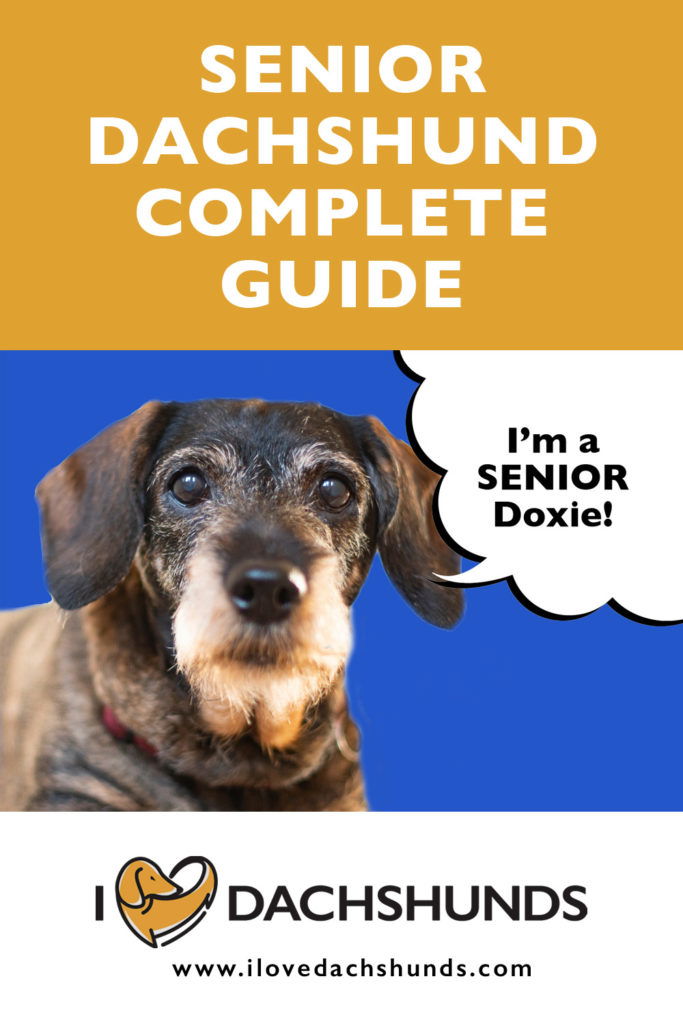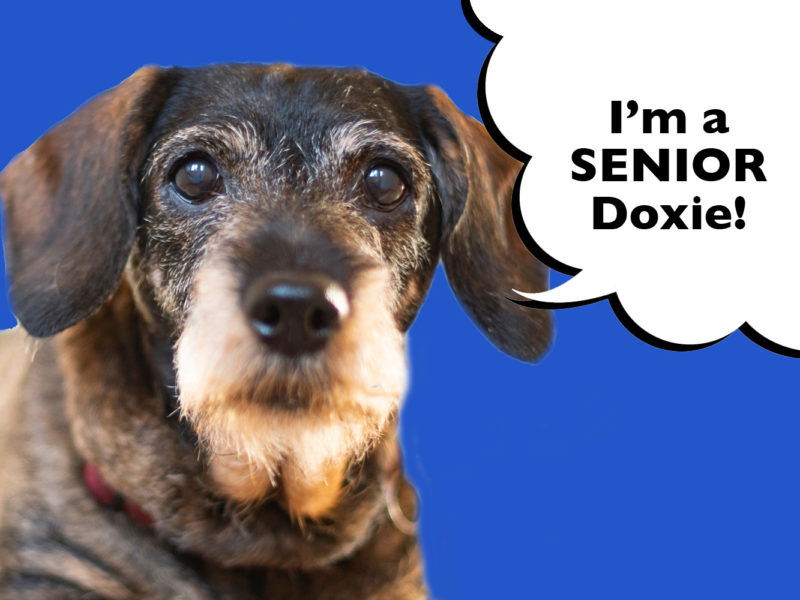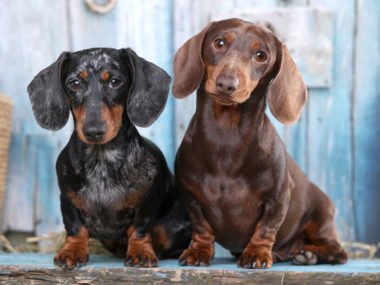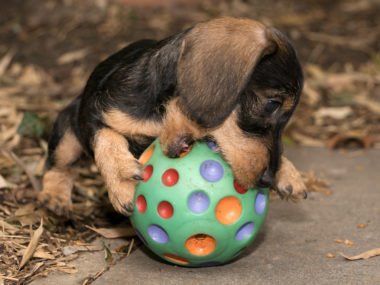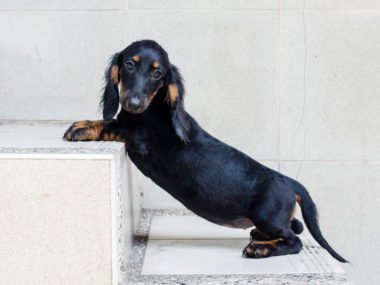Has your Dachshund started to slow down or struggle with joint pain? Maybe you’re wondering what age they reach their senior years? Here’s everything you need to know about senior Dachshunds!
How Do I Care For A Senior Dachshund?
- Switch Over To Senior Dog Food
- Keep On Top Of Dental Health
- Focus On Joint Care
- Get An Orthopaedic Dog Bed
- Keep Them Active
- Watch Their Weight
- Handle Them Carefully
- Don’t Let Them Jump Or Climb Stairs
- Wrap Them Up Warm
- Keep Them Out Of Hot Sun
- Provide Enrichment Activities
- Get Regular Vet Checks
There are many different things you can do to help your senior Dachshund stay happy and healthy for as long as possible. Read on to find out what else you need to know!
Table of Contents
This article is based on research and personal experience as a Dachshund owner of 10+ years. I’m not a Vet, qualified dog trainer or dog behaviourist.
Senior Dachshund Age
Dachshunds are generally considered to be senior dogs when they’re around 11 years of age. Although, it can also be based on how they are both physically and mentally.
A Miniature Dachshund’s usual life expectancy is between 12 – 16 years. Standard Dachshunds have a slightly shorter life expectancy of around 12 – 14 years.
This is the average life expectancy for Dachshunds, although many can and do live for much longer than this.
This means your Dachshund can be considered a senior for a large part of their adult lives.
Senior Dachshund Diet
Your Dachshund’s dietary requirements will change when they get to around 9-11 years old.
So it’s important that you switch your Dachshund’s food over to something that’s more suitable for their age.
Dog food that is specifically formatted for senior dogs generally contains:
Less fat
Consuming less fat is important for senior Dachshunds as they’re more prone to becoming overweight as their activity levels decrease. Allowing your Dachshund to gain too much weight can put extra pressure on their joints and spine.
More protein
Protein helps to maintain your senior Dachshund’s muscles which can deteriorate as they age. By keeping their muscles strong, this helps to support their joints and spine.
Added joint supplements
The most common joint supplements added to senior dog food are Glucosamine and Chondroitin. These help to keep your Dachshund’s joints from becoming stiff as they age.
Omega 3 and 6
Omega 3 and 6 fatty acids help to maintain your senior Dachshund’s skin and coat health, and can boost their immune system too.
Senior Dog Food
Ideally, you want to feed a high quality wet or dry senior dog food, that’s nutritional complete and 100% natural – no added salt, sugars, fillers and artificial nasties!
If you can, go for something that’s gluten, grain, egg and dairy free as these can be common allergens for many Dachshunds!
Wet or dry senior dog food with salmon is a popular choice for older Dachshunds. It’s naturally low in fat, high in protein and easy to digest for those that have sensitive stomachs.
If your senior Dachshund seems to be struggling to crunch up their dry food, then it may be a good idea to switch to a complete wet food instead so they’re not missing out on any nutrients.
I personally feed Scrumbles senior dog food to our 11 year old Dachshund. Not only has it improved his energy levels, joint health and poops, but it’s also transformed his skin and coat too!
To find out more about the nutritional content of your chosen senior dog food, check out the All About Dog Food site.
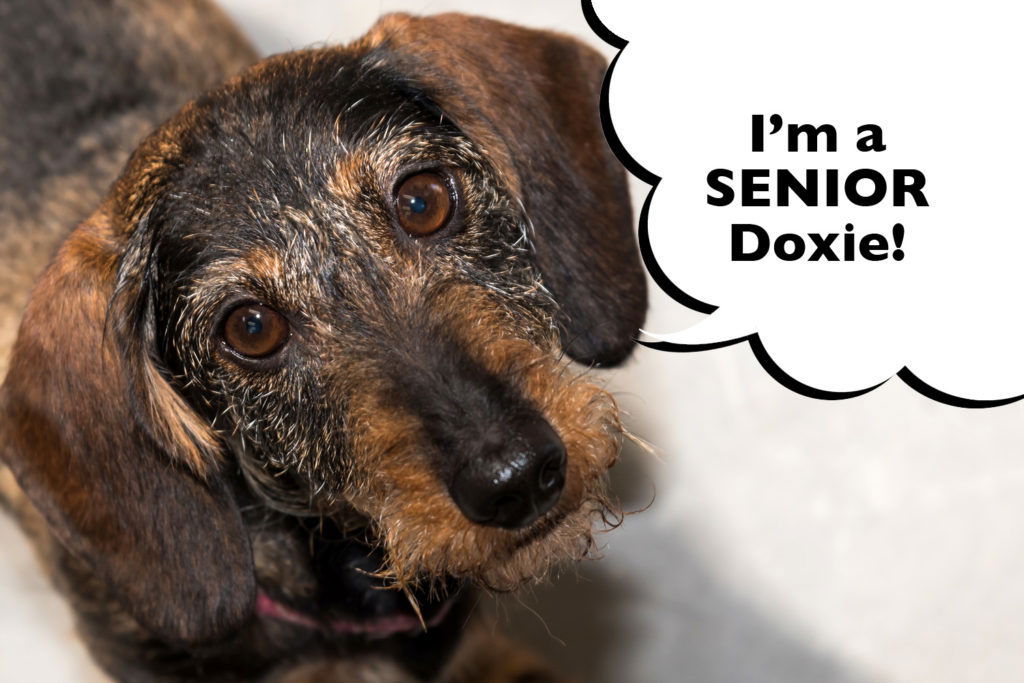
Senior Dachshund Dental Health
As your Dachshund gets older, dental issues will be more common. So it’s important to get a regular Vet check to make sure their teeth are ok.
The Vet will look for things like chips, discolouration, tartar build-up, bad breath and gingivitis.
Tartar can quickly lead to tooth decay and gum disease. It can even cause your Dachshund’s teeth to fall out if left untreated.
Gum disease and tooth decay can be really painful for your Dachshund and make it difficult or even impossible for them to eat properly.
Not only this, the buildup of bacteria in their mouths can cause serious secondary issues like kidney, heart or liver disease.
Your Vet may suggest you book your Dachshund in to get their teeth professionally cleaned and descaled and any extractions done.
Obviously, being a senior Dachshund, they may need to do additional blood work to be sure it’s safe to have the procedure.
Vet checks are an important part of maintaining good oral health.
Even though your senior Dachshund may well continue to eat as normal, their mouths or teeth could still be painful.
Senior Dachshund Joint Care
As Dachshunds age, they can be prone to Arthritis and other degenerative joint diseases.
You may notice they’re less keen on walking or playing and are slower getting up and about in the morning.
If your senior Dachshund is showing any signs of discomfort when they’re moving around or getting up, then be sure to get them checked by your Vet ASAP!
It may be that they require veterinary prescribed pain relief medication to help them feel more comfortable.
Whilst many senior dog foods already contain added joint support, they may not be enough to keep your Dachshund’s joints healthy on their own.
That’s why some owners add additional joint supplements like Glucosamine and Chondroitin, Turmeric, Green Lipped Mussel or Omega 3.
However, you should always discuss all the available options with your Vet first to find the most suitable joint supplement for your individual Dachshund.
As well as medications and supplements, you could also get your senior Dachshund an orthopedic dog bed to sleep on.
A supportive dog bed made from memory foam will make then feel more comfortable when they’re sleeping. It’ll also help to reduce the pressure on their joints and give more stability when they try to stand up!
Other alternative treatments to help with your senior Dachshund’s joint care are:
Canine Hydrotherapy
Canine Hydrotherapy is where your Dachshund swims in a controlled environment to help improve their fitness, increase mobility and build muscle to help their joints. It’s a low impact exercise that’s non-weight baring – which is perfect for seniors!
Canine Physiotherapy
Canine Physiotherapy helps to increase the movement of your senior Dachshund’s muscles and joints and improve their quality of life. Ideal for pain management, recovery from surgery, degenerative joint diseases like Arthritis, back pain and other age-related diseases.
Canine Acupuncture
Canine Acupuncture is a pain-relieving treatment that improves blood circulation and promotes healing. It can also help to enhance a Dachshund’s immune system, increasing their ability to fight off diseases. Again, brilliant for Arthritis and other degenerative joint diseases!
If your senior Dachshund is showing any signs of joint pain, work with your Vet to figure out a holistic treatment plan best suited to their needs.
Senior Dachshund Exercise Needs
As your Dachshund gets older, it’s likely that their energy levels may decrease.
They might prefer one or two short walks each day, rather than one long one, so they have time to rest in between.
Try to avoid intensive exercise as this can leave your Dachshund feeling stiff and sore the next day and stop them from wanting to go out.
Exercising your senior Dachshund little and often is best, especially if they have any signs of Arthritis or other joint problems.
However, it’s not a good idea to simply stop exercising them completely. This can actually do more harm than good!
By keeping your senior Dachshund moving gently, this can help to keep their mobility levels stable.
If they stop getting any exercise at all, their joints can become stiffer which can actually make it more difficult for them to get up and about.
Not only is physical exercise important to your Dachshund’s muscles and joints, but it’s crucial to their mental wellbeing too.
If they’ve been used to exploring the outside world regularly, stopping completely could be detrimental to their health and fitness too.
Even if your senior Dachshund has severe mobility issues, they can still be gently carried to their favourite walking spot where they can enjoy a slow sniff around at their own pace.
Or alternatively, you could even get a stroller and just take them out for some fresh air each day!

Senior Dachshund Weight
Just like humans, Dachshunds are more at risk of obesity as they reach their senior years.
They don’t want to do as much exercise, their metabolism slows down and they start to sleep a lot more during the day.
If your Dachshund is carrying too much weight, it can sadly lead to diabetes, joint issues and even heart problems.
That’s why it’s important to keep a close eye on their weight as they enter their senior years.
You can do this by weighing your Dachshund regularly either at home or your local Vets.
You can also do some visual checks at home by running your hands gently along their ribcage.
There should be a thin layer of fat covering their ribs. So, if you cant feel the ribs at all, your Dachshund is likely overweight.
When you look at your Dachshund from above, there should also be a visible tuck to their waist and no rolls of fat by their shoulder blades and neck area.
Doing these visual checks and weighing your senior Dachshund regularly is the best way to spot any changes and keep them at their ideal weight!
Senior Dachshund Care
Dachshunds are known for having delicate spines and joints which can leave them prone to developing injuries.
The risks can increase further as your Dachshund ages because their bones and muscles are far weaker than they once were.
It’s even more essential that you’re gentle when handling your senior Dachshund, especially if you’re picking them up.
It’s also important to watch their interactions with other dogs. They may find puppies too exuberant or could get injured accidentally if they’re jumped on or knocked into.
This goes for other dogs that your senior Dachshund lives with too, as well as those that they meet while out on walks.
Try to avoid letting them jump on or off furniture, in and out of the car, or up and down stairs in the home too.
These are all things that you should try and avoid throughout your Dachshund’s life, but will be even more important as your Dachshund gets older.
Setup dog ramps around your home and teach your senior Dachshund how to use them.
If they were to get injured at this later stage in life, they may have a much longer recovery and higher risk of complications during surgery.
Senior Dachshund Mental Health
Mental stimulation for senior Dachshunds is sometimes overlooked.
Just because your Dachshund is older, doesn’t necessarily mean that their brains are any less active than they once were.
By providing them with mental enrichment activities, this gives your senior Dachshund something interesting and engaging to think about.
For example, puzzle toys filled with tasty treats to search out, snuffle mats to get them to forage for treats, food toys to chew and play with, or lick mats covered in spreadable snacks.
On top of this, you can still teach them new tricks and commands. Teach them to push a button for treats or ring a bell to go outside to potty. It’s never too late to learn!
All of these enrichment activities can be adapted to best suit your senior Dachshund’s needs.
Even if their mobility is more limited than it used to be, they will still enjoy using their brains to figure things out.
Enrichment is particularly important for elderly Dachshunds who might not be able to get as much stimulation from regular walks as they once did.
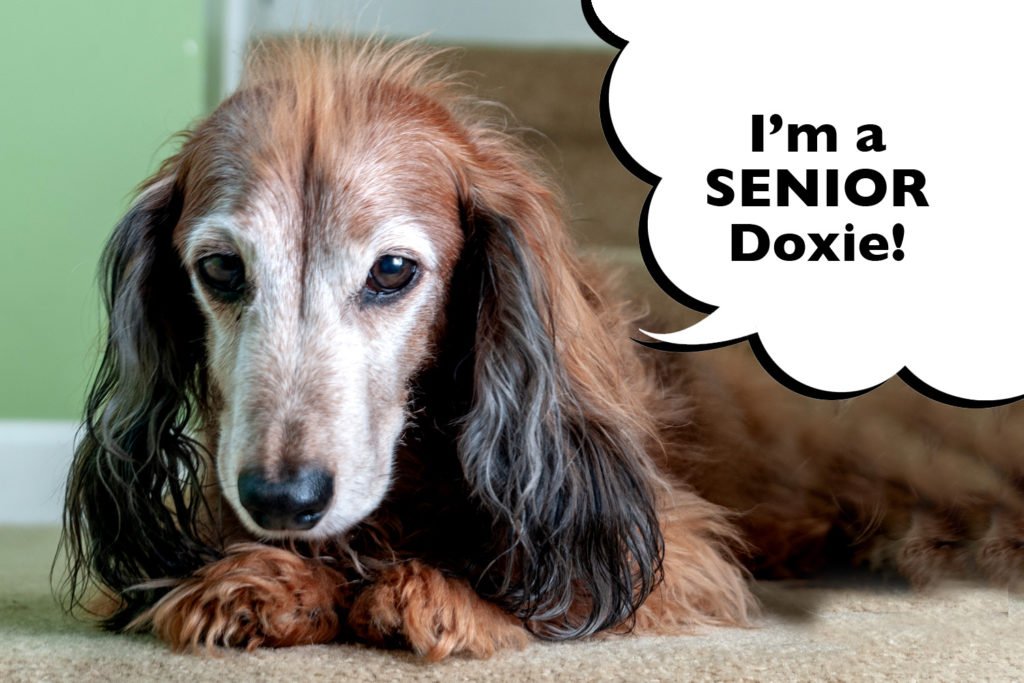
Senior Dachshund Climate
Most Dachshunds feel the cold as their bellies are low to the ground. But senior Dachshunds are going to feel the cold much more as they age, especially in their joints.
So, if you go out on a cold day, be sure to wrap them up in a coat or fleece, and don’t go out for too long.
If it rains, be sure to dry them off when you get back home and wrap them in a cosy blanket.
Be mindful of hot and humid weather too. Senior Dachshunds will be at much higher risk of getting heat exhaustion and heatstroke as they age.
So it’s best to keep them inside in the cool on days where it’s too hot outside.
Senior Dachshund Vet Checks
As your Dachshund moves into their senior years, it’s important to get regular vet checks to make sure that everything is ok.
You also need to keep up with vaccinations, flea and worming treatments that your Vet prescribes.
Senior Dachshunds are prone to various health problems including obesity, thyroid issues, skin problems, knee dislocation, hip dysplasia, eye conditions and back injuries.
As they start to age, you may begin to notice some changes. For example:
- Sleep disturbances
- Incontinence
- Disorientation
- Lumps
- Enlarged anal glands
- Lameness
- Stiff joints
- Back pain
- Hair loss
- Skin changes
- Loss of appetite
- Eyesight issues
- Hearing changes
- General pain
- Other symptoms
If you notice any mental, physical or behavioural changes in your senior Dachshund or anything else out of the ordinary, then contact your Vet right away!
Senior Dachshund Love
The best thing you can do for your senior Dachshund is to simply love them unconditionally. Let them know that whatever happens, you’re in it together.
Give them more kisses, more cuddles, more belly rubs, more attention and more fuss! Laugh at them, laugh with them, play with them, protect them, and comfort them when they need you.
Treasure each day with them, look after them as they age, and give them the best care you can.
At the end of the day, they’re just happy being by your side because all they really want and need is YOU!
To find out how old your senior Dachshund is in human years, click here!
What do I do next?
If you read all the way to the end of this article, you’re exactly the sort of person I’d LOVE to join my Facebook Group. Your support for my blog means everything to me so, if you found this article helpful, please kindly share below. Thank you! 💋
